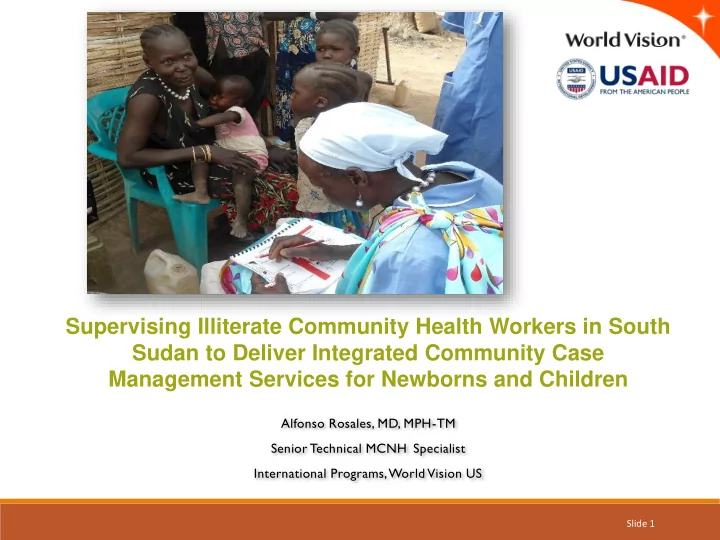

Supervising Illiterate Community Health Workers in South Sudan to Deliver Integrated Community Case Management Services for Newborns and Children Alfonso Rosales, MD, MPH-TM Senior Technical MCNH Specialist International Programs, World Vision US Slide 1
Introduction Importance of community-based supervision research: • Lack of documentation • Evidence supports only facility-based supervision • Community health workers need to be competent to administer treatments Slide 2
South Sudan Fragile state High rates High rates of maternal of poverty and newborn and illiteracy mortality Utilizes huge community-based platform Slide 3
Background Project: Mother and Child Health Transformation (MaCHT), USAID-funded Child Survival and Health Grants Program 2010-2014 Location: Gogrial East and Gogrial West counties, Warrap State, South Sudan Total Population: 148,000 people of the ethnic agro-pastoral Twic Dinka tribe. Barriers: decades of conflict, poor infrastructure, and vast logistical, social and political hurdles Maternal Mortality Ratio: 2,054 per 100,000 live births: the highest in the world.* 1 qualified midwife per 30,000 people * *Source, UNDP, 2014 Slide 4
Objectives The objectives of this study are to describe and assess a supervision model for illiterate CHWs providing care to mothers, newborns, and children in Warrap State, South Sudan. Slide 5
Intervention Concept of Supervision Three-function supervision model: Formative Supervision – improve instruction, skills 1. development, and knowledge retention Normative Supervision – address skills and 2. equipment management Restorative Supervision – support, reduce burn-out, 3. and improve satisfaction Slide 6
Slide 7
Formative Tools • • CCM Pilot Child Health Manual Flipchart Recording Form • • Newborn Health Weekly Checklist Recording Form for OR Supervisors Normative Tools Restorative Tools • • Referral form CHW Skills Certification Test • Supervision Checklist Slide 8
Findings Total number of children seen: 2,552 RIR= 73% RCR=92% ATPCC= 98.1 Hours per week= 2 Slide 9
Findings • 75% completion rate for supervision visits • 87% of CHWs were accredited as competent to deliver iCCM-Plus after 12 weeks • Only 7% discrepancy between illness classification and treatment • Registration completion rate 92% • Zero stock-outs Slide 10
Discussion What do our results mean? • Quality of training and ongoing mentoring are appropriate given the level of formal education among participants • Formal education may not necessarily be a predictive criterion for performance among community health workers • CHWs are effective in at improving key MNCH practices • A supervision process within a community case management strategy is important • Supportive supervision immediately after training is key to ensuring skill and competency Slide 11
Recommendations • Supervision should be integral to Community Health Workers programs • Future studies should involve a control group • If volunteer CHWs can provide quality care and improved access to care in developing countries in a highly cost-effective manner as supported by evidence-based research, their place in health care system structures can be formally established Slide 12
Questions? Slide 13
Recommend
More recommend